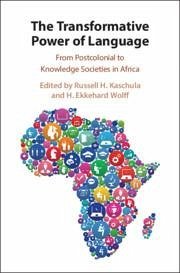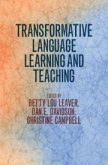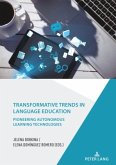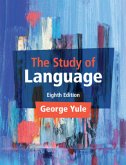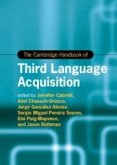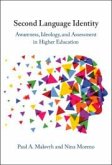The Transformative Power of Language
Herausgeber: Kaschula, Russell H; Wolff, H Ekkehard
Schade – dieser Artikel ist leider ausverkauft. Sobald wir wissen, ob und wann der Artikel wieder verfügbar ist, informieren wir Sie an dieser Stelle.
The Transformative Power of Language
Herausgeber: Kaschula, Russell H; Wolff, H Ekkehard
- Gebundenes Buch
- Merkliste
- Auf die Merkliste
- Bewerten Bewerten
- Teilen
- Produkt teilen
- Produkterinnerung
- Produkterinnerung
With contributions from a team of global scholars, the book highlights the role of language in sociocultural, academic and economic advancement, in postcolonial Africa. It explores how the integration of global and local linguistic and cultural resources help to achieve mental decolonisation and create globally competitive knowledge societies.
Andere Kunden interessierten sich auch für
![Transformative Language Learning and Teaching Transformative Language Learning and Teaching]() Transformative Language Learning and Teaching122,99 €
Transformative Language Learning and Teaching122,99 €![Transformative Trends in Language Education Transformative Trends in Language Education]() Transformative Trends in Language Education59,95 €
Transformative Trends in Language Education59,95 €![The Study of Language The Study of Language]() George YuleThe Study of Language28,99 €
George YuleThe Study of Language28,99 €![The Cambridge Handbook of Third Language Acquisition The Cambridge Handbook of Third Language Acquisition]() The Cambridge Handbook of Third Language Acquisition196,99 €
The Cambridge Handbook of Third Language Acquisition196,99 €![Creating Effective Blended Language Learning Courses Creating Effective Blended Language Learning Courses]() Daria Mizza (The Johns Hopkins University)Creating Effective Blended Language Learning Courses127,99 €
Daria Mizza (The Johns Hopkins University)Creating Effective Blended Language Learning Courses127,99 €![Second Language Identity Second Language Identity]() Paul A MalovrhSecond Language Identity115,99 €
Paul A MalovrhSecond Language Identity115,99 €![Police Interrogation, Language, and the Law Police Interrogation, Language, and the Law]() Marianne MasonPolice Interrogation, Language, and the Law115,99 €
Marianne MasonPolice Interrogation, Language, and the Law115,99 €-
-
-
With contributions from a team of global scholars, the book highlights the role of language in sociocultural, academic and economic advancement, in postcolonial Africa. It explores how the integration of global and local linguistic and cultural resources help to achieve mental decolonisation and create globally competitive knowledge societies.
Produktdetails
- Produktdetails
- Verlag: Cambridge University Press
- Seitenzahl: 320
- Erscheinungstermin: 10. September 2020
- Englisch
- Abmessung: 229mm x 152mm x 22mm
- Gewicht: 694g
- ISBN-13: 9781108498821
- ISBN-10: 1108498825
- Artikelnr.: 58600715
- Herstellerkennzeichnung
- Libri GmbH
- Europaallee 1
- 36244 Bad Hersfeld
- gpsr@libri.de
- Verlag: Cambridge University Press
- Seitenzahl: 320
- Erscheinungstermin: 10. September 2020
- Englisch
- Abmessung: 229mm x 152mm x 22mm
- Gewicht: 694g
- ISBN-13: 9781108498821
- ISBN-10: 1108498825
- Artikelnr.: 58600715
- Herstellerkennzeichnung
- Libri GmbH
- Europaallee 1
- 36244 Bad Hersfeld
- gpsr@libri.de
Introduction: Transformative power and resourcefulness of African languages
in the information and knowledge age Russell H. Kaschula and H. Ekkehard
Wolff; Part I. Mental decolonisation and cultural diversity: 1. The role of
African languages in decolonising South African universities Thulani
Mkhize; 2. Adapt or die - Maintaining or decolonising language practices?
Theodore Rodrigues; 3. Decolonising our minds, decolonising our languages:
A mentalist approach to language attitudes Mantoa Motinyane; Part II.
Multilingualism and intellectualisation of African languages: 4.
Transformative power of language policies in higher education: A legal
English approach or a linguistic African language approach? Zakeera Docrat
and Russell H. Kaschula; 5. African languages in transformation: Challenges
and opportunities for Zimbabwe and South Africa Emmanuel Sithole and
Ziyanda Yola; 6. Linguistic diversity in higher education: inclusion or
exclusion? Zakhile Somlata; 7. An impact study with reference to isiXhosa
and Afrikaans multilingual glossaries for 1st year Law of Contracts
students at Cape Peninsula University of Technology Linda Manashe, Boniface
Kabaso, Monwabisi K. Ralarala, and Eunice Ivala; 8. The need for
multicultural and multilingual sensitivity in transforming Graphic Design
curriculum in a University of Technology Lindie Bhebhe, Monwabisi K.
Ralarala, and Alettia Chisin; 9. An analysis of the language legislation
effects in the banking sector: Towards the realisation of multilingualism
in South Africa Menzi Zamokwakhe Thango and Wisdom Ntando Moyo; Part III.
Digitalisation and democratisation of knowledge: 10. African language
resources for knowledge societies Justus C. Roux; 11. Wikipedia as
transformative multilingual knowledge resource Laurette Pretorius and
Friedel Wolff; 12. Corpora as agency in the intellectualisation of African
languages Langa Khumalo; 13. From postcolonial African language
lexicography to globally competitive e-lexicography in Africa D. J.
Prinsloo and Nompumelelo Zondi; Part IV. Interlingual and intercultural
cross-fertilisation: 14. Orality in the Digital Age Janet Hayward; 15.
Interpreting research in South Africa: Where to begin to transform?
Herculene Kotzé and Kim Wallmach; 16. Exploring the potential of increasing
epistemological access for university students of African languages through
the translation of English academic texts Ntombovuyo Ngaphu; 17.
Translation in foreign language teaching - cultivating critical reflection
and symbolic competence Natasha Engelbrecht.
in the information and knowledge age Russell H. Kaschula and H. Ekkehard
Wolff; Part I. Mental decolonisation and cultural diversity: 1. The role of
African languages in decolonising South African universities Thulani
Mkhize; 2. Adapt or die - Maintaining or decolonising language practices?
Theodore Rodrigues; 3. Decolonising our minds, decolonising our languages:
A mentalist approach to language attitudes Mantoa Motinyane; Part II.
Multilingualism and intellectualisation of African languages: 4.
Transformative power of language policies in higher education: A legal
English approach or a linguistic African language approach? Zakeera Docrat
and Russell H. Kaschula; 5. African languages in transformation: Challenges
and opportunities for Zimbabwe and South Africa Emmanuel Sithole and
Ziyanda Yola; 6. Linguistic diversity in higher education: inclusion or
exclusion? Zakhile Somlata; 7. An impact study with reference to isiXhosa
and Afrikaans multilingual glossaries for 1st year Law of Contracts
students at Cape Peninsula University of Technology Linda Manashe, Boniface
Kabaso, Monwabisi K. Ralarala, and Eunice Ivala; 8. The need for
multicultural and multilingual sensitivity in transforming Graphic Design
curriculum in a University of Technology Lindie Bhebhe, Monwabisi K.
Ralarala, and Alettia Chisin; 9. An analysis of the language legislation
effects in the banking sector: Towards the realisation of multilingualism
in South Africa Menzi Zamokwakhe Thango and Wisdom Ntando Moyo; Part III.
Digitalisation and democratisation of knowledge: 10. African language
resources for knowledge societies Justus C. Roux; 11. Wikipedia as
transformative multilingual knowledge resource Laurette Pretorius and
Friedel Wolff; 12. Corpora as agency in the intellectualisation of African
languages Langa Khumalo; 13. From postcolonial African language
lexicography to globally competitive e-lexicography in Africa D. J.
Prinsloo and Nompumelelo Zondi; Part IV. Interlingual and intercultural
cross-fertilisation: 14. Orality in the Digital Age Janet Hayward; 15.
Interpreting research in South Africa: Where to begin to transform?
Herculene Kotzé and Kim Wallmach; 16. Exploring the potential of increasing
epistemological access for university students of African languages through
the translation of English academic texts Ntombovuyo Ngaphu; 17.
Translation in foreign language teaching - cultivating critical reflection
and symbolic competence Natasha Engelbrecht.
Introduction: Transformative power and resourcefulness of African languages
in the information and knowledge age Russell H. Kaschula and H. Ekkehard
Wolff; Part I. Mental decolonisation and cultural diversity: 1. The role of
African languages in decolonising South African universities Thulani
Mkhize; 2. Adapt or die - Maintaining or decolonising language practices?
Theodore Rodrigues; 3. Decolonising our minds, decolonising our languages:
A mentalist approach to language attitudes Mantoa Motinyane; Part II.
Multilingualism and intellectualisation of African languages: 4.
Transformative power of language policies in higher education: A legal
English approach or a linguistic African language approach? Zakeera Docrat
and Russell H. Kaschula; 5. African languages in transformation: Challenges
and opportunities for Zimbabwe and South Africa Emmanuel Sithole and
Ziyanda Yola; 6. Linguistic diversity in higher education: inclusion or
exclusion? Zakhile Somlata; 7. An impact study with reference to isiXhosa
and Afrikaans multilingual glossaries for 1st year Law of Contracts
students at Cape Peninsula University of Technology Linda Manashe, Boniface
Kabaso, Monwabisi K. Ralarala, and Eunice Ivala; 8. The need for
multicultural and multilingual sensitivity in transforming Graphic Design
curriculum in a University of Technology Lindie Bhebhe, Monwabisi K.
Ralarala, and Alettia Chisin; 9. An analysis of the language legislation
effects in the banking sector: Towards the realisation of multilingualism
in South Africa Menzi Zamokwakhe Thango and Wisdom Ntando Moyo; Part III.
Digitalisation and democratisation of knowledge: 10. African language
resources for knowledge societies Justus C. Roux; 11. Wikipedia as
transformative multilingual knowledge resource Laurette Pretorius and
Friedel Wolff; 12. Corpora as agency in the intellectualisation of African
languages Langa Khumalo; 13. From postcolonial African language
lexicography to globally competitive e-lexicography in Africa D. J.
Prinsloo and Nompumelelo Zondi; Part IV. Interlingual and intercultural
cross-fertilisation: 14. Orality in the Digital Age Janet Hayward; 15.
Interpreting research in South Africa: Where to begin to transform?
Herculene Kotzé and Kim Wallmach; 16. Exploring the potential of increasing
epistemological access for university students of African languages through
the translation of English academic texts Ntombovuyo Ngaphu; 17.
Translation in foreign language teaching - cultivating critical reflection
and symbolic competence Natasha Engelbrecht.
in the information and knowledge age Russell H. Kaschula and H. Ekkehard
Wolff; Part I. Mental decolonisation and cultural diversity: 1. The role of
African languages in decolonising South African universities Thulani
Mkhize; 2. Adapt or die - Maintaining or decolonising language practices?
Theodore Rodrigues; 3. Decolonising our minds, decolonising our languages:
A mentalist approach to language attitudes Mantoa Motinyane; Part II.
Multilingualism and intellectualisation of African languages: 4.
Transformative power of language policies in higher education: A legal
English approach or a linguistic African language approach? Zakeera Docrat
and Russell H. Kaschula; 5. African languages in transformation: Challenges
and opportunities for Zimbabwe and South Africa Emmanuel Sithole and
Ziyanda Yola; 6. Linguistic diversity in higher education: inclusion or
exclusion? Zakhile Somlata; 7. An impact study with reference to isiXhosa
and Afrikaans multilingual glossaries for 1st year Law of Contracts
students at Cape Peninsula University of Technology Linda Manashe, Boniface
Kabaso, Monwabisi K. Ralarala, and Eunice Ivala; 8. The need for
multicultural and multilingual sensitivity in transforming Graphic Design
curriculum in a University of Technology Lindie Bhebhe, Monwabisi K.
Ralarala, and Alettia Chisin; 9. An analysis of the language legislation
effects in the banking sector: Towards the realisation of multilingualism
in South Africa Menzi Zamokwakhe Thango and Wisdom Ntando Moyo; Part III.
Digitalisation and democratisation of knowledge: 10. African language
resources for knowledge societies Justus C. Roux; 11. Wikipedia as
transformative multilingual knowledge resource Laurette Pretorius and
Friedel Wolff; 12. Corpora as agency in the intellectualisation of African
languages Langa Khumalo; 13. From postcolonial African language
lexicography to globally competitive e-lexicography in Africa D. J.
Prinsloo and Nompumelelo Zondi; Part IV. Interlingual and intercultural
cross-fertilisation: 14. Orality in the Digital Age Janet Hayward; 15.
Interpreting research in South Africa: Where to begin to transform?
Herculene Kotzé and Kim Wallmach; 16. Exploring the potential of increasing
epistemological access for university students of African languages through
the translation of English academic texts Ntombovuyo Ngaphu; 17.
Translation in foreign language teaching - cultivating critical reflection
and symbolic competence Natasha Engelbrecht.

